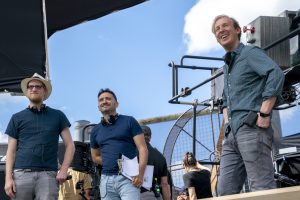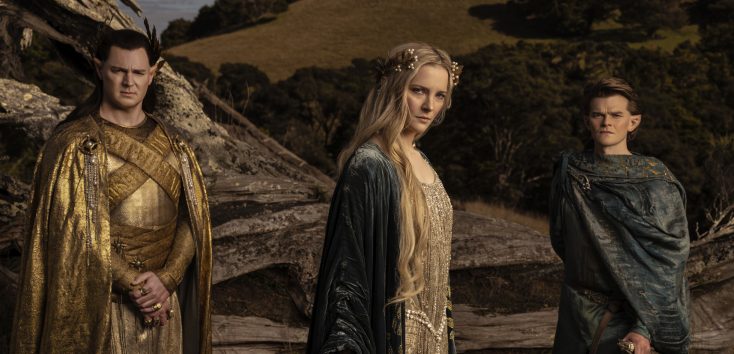
(l-r) JD Payne, J.A. Bayona and Patrick McKay on the set of THE LORD OF THE RINGS: THE RINGS OF POWER. ©Amazon Studios. CR: Ben Rothstein/Prime Video.
By JUDY SLOANE
Front Row. Features
HOLLYWOOD-Set thousands of years before the events of J.R.R. Tolkien’s The Hobbit and The Lord of the Rings, Prime Video’s “The Lord of the Rings: The Rings of Power” begins in a time of relative peace, in the fabled Second Age of Middle-earth’s history, where the people are forced to confront the re-emergence of evil.
Based on the heroic legends that were scattered throughout Tolkien’s trilogy, Executive Producers, writers and Showrunners, J.D. Payne and Patrick McKay (“Star Trek Beyond,” “Jungle Cruise”), take on the monumental task of bringing new stories and characters to the viewing audience, recently speaking with the TV Critics Association about their journey. The one-hour drama series starts streaming on Prime Video on September 2nd, 2022.
Q: I understand that this series is not based on the novels but expands upon Tolkien’s stories. Can you elaborate on that?
J.D. Payne: It’s based on the appendices, which come at the end of “The Lord of The Rings” trilogy. Also, poems, songs, stories and half-whispered rumors and histories are found scattered throughout the text. Tolkien is a treasure hunt where there are some places where he’ll give little summaries and you’ll get bits. But often it’s a whispered thing that someone will say, so you get a little nugget. Our job as storytellers has been to really excavate that and to look at the connections between the little nuggets that you get because it’s always the tip of the iceberg.
Our job is to take you back to a time set many thousands of years before the stories that you know, thousands of years before Frodo, before the ring. We’re going back to a time in which the Rings of Power were forged, in which we are showing the rise of the dark lord Sauron, the story of Tolkien’s Númenor. We would take the little clues that Tolkien gave us, and build them into entire storylines or characters.
Patrick McKay: The privilege and joy really of assembling that jigsaw puzzle is that this is a new story for most audiences who are going to be watching it. We felt from the very beginning as producers that we weren’t interested in a show that was a nostalgia play, a retread, a reboot or a sequel. We felt that the show had to earn its place on the stage and stand on its own two feet and hopefully rise or fall in its own merits.
[They] are different stories than you’ve seen before onscreen from Tolkien. His themes and the ideas that he wrote about, his language are throughout the show, his world, and his characters. But audiences are going to be going on a new experience than they’ve had before.
Q: Why do you think Tolkien’s work continues to resonate and has been so influential on so many other films, television and books?
Payne: There’s not a human on planet Earth that escapes unscathed in this life. Struggle is a universal human experience and the magical thing about Tolkien is that he finds you where you are, whatever the struggle is, you can see yourself in the characters and the characters in you. Their journeys become your journeys and I think we’ve all experienced that over the last couple of years and it’s been a privilege.
Q: The original trilogy is so connected to Tolkien’s time and what was happening in the world. This is obviously coming out at a very different time. Were you thinking about any kind of parallels to 2022 or when you were writing this in 2019?
Payne: I would say only inasmuch as there’s always going to be darkness in the world, there’s always going to be the challenges that people are going through. Tolkien was very vocal in his writings about issuing allegory. He didn’t want to make something where you could look at it and say, “Oh, this is obviously this political character” or “Obviously, this place represents that country,” because it makes the work smaller.
Tolkien wanted to make things that would be timeless and would be for all of the ages, and so we sought to do the same thing. If there were stories that happened to resemble anything that was going on [now,] we would try to give them a little bit more complexity so you couldn’t say, “Oh, clearly these people represent this branch of whatever and these people represent that.”
From the time we started working on the show until we finished shooting Season 1, there had been a global pandemic, various economic, and political, and social [issues,] and we felt more than ever that the world needed that unique, special kind of hope that Tolkien can bring to it. So if there was anything timely, it was the urgency and the need for what Middle-Earth gives to people to be able to come and bring it to our world right now.
McKay: Tolkien wanted to create a mythos that was applicable to people wherever they are and whenever they are, and we’ve all aspired to craft the show in the same way. The dream would be if 20 years from now the show is just as applicable then as it is now, and doesn’t feel dated, and we certainly aspire to that special, timeless thing that Tolkien seemed to be able to do effortlessly.





